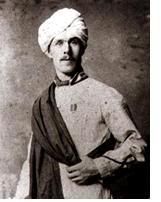
When The Salvation Army began it’s work in Leamington, England, young Henry Bullard had no idea that he was about to begin a great adventure. Henry’s exciting journey began when he entered the Army’s building to attend their first bible study in his home town. He sat down and soon found himself surrounded by a vigorous and enthusiastic group of Salvationists.
He left that bible study, and that night—during a time of spiritual wrestling—he accepted Christ as his Savior in his own bedroom. Feeling that he ought to confess God publicly, Henry knelt at the Mercy Seat during the first public meeting which was led by Commissioner Elijah Cadman. Soon after, he became a Soldier and was accepted to enter officer training in 1880 and was appointed to Attercliffe, England after he was commissioned as an officer.
During his following appointments he was subjected to extreme poverty, riots, bitter opposition and imprisonment. While stationed in Grantham, England he received a telegram asking him to consider pioneering the Army’s work in India. He eagerly agreed, and was sent to join forces with Frederick Booth-Tucker, to help prepare their invasion.
In August, 1882, their missionary party sailed for India. They wore semi-native clothing consisting of white suits, long coats, turbans and boots. Before they arrived, the local Indian newspapers had urged the government to stop them from entering India. This controversy created such an interest that a large crowd of police and townspeople were on the landing dock to see the invading Army come ashore.
When the group of four arrived, they were greeted by Police Superintendent Harry Brewin who asked them: “When will the other members of the party land?” In a surprise Booth-Tucker replied, “We are the whole of the Army.” The Superintendent was amazed and responded, “Why, we were expecting you to arrive a thousand strong.” The four harmless missionaries came together and got off the ship; Booth-Tucker carried the flag given to them by Catherine Booth, Bullard followed by playing his cornet, Norman Thompson beat his drum and his wife Mary followed behind with the first tambourine display India had ever seen.
At the time, it was forbidden to play musical instruments while marching in the streets. To the loud and rambunctious group of Salvationists, this was a law that they wanted to challenge. And after a long and skillfully argued process, they were free to use instruments on the march throughout the entire country of India. Henry’s missionary struggle was not gained without sacrifice; during his first year in India he traveled 17,000 miles, and was associated with many of the heroic early day Salvation victories of the time.
Henry visited Ceylon (now known as Sri Lanka) in 1883 and in 1884 he was married to Selina Roffey. Theirs was the first Army wedding to take place in India. It was also at this time that Captain Bullard stopped wearing boots, his last link with European dress. He and others felt that to meet the needs of the day, they should fully adopt the life of the Indian people.
The Bullard’s were transferred from India to International Headquarters in England. They would return to India seven years later in the capacity of Traveling Secretary and later as the Territorial Commander for the Northern Territory. Later, the Bullard’s would be transferred to help with the Army’s work in Japan.
It was during his time of service in Japan when Henry began a great campaign to bring freedom to girls held under the Yoshiwara system of licensed prostitution, which trapped women in sexual slavery and denied them their freedom. This crusade attracted world-wide attention and because of Henry’s work, the government secured the right for prostituted women to go free if they wished. Within a year, 12,000 women had claimed their freedom from prostitution. Henry’s work and influence in Japan were of such righteous character that his name was placed by an influential committee amongst the “benefactors of modern Japan” one of the highest honors given in Japan.
After spending fifteen years in Japan (and becoming fluent in Japanese), the Bullard’s returned to England because Selina was in poor health. Henry still undertook many important tasks, including the temporary command of British East Africa and Secretary for Emigration in 1922. In 1926, after forty-six years Officership, they retired from active Service. Self-sacrifice, faith, heroism and an ability to work hard are some of the reasons why Henry Bullard ever remembered as one of the Army’s fighting saints.
For more information about Henry Bullard check out “This Quiet Man!” by Catherine Sturgess. Click here to download zip file.
(Compiled and edited from the International Heritage Centre Website)